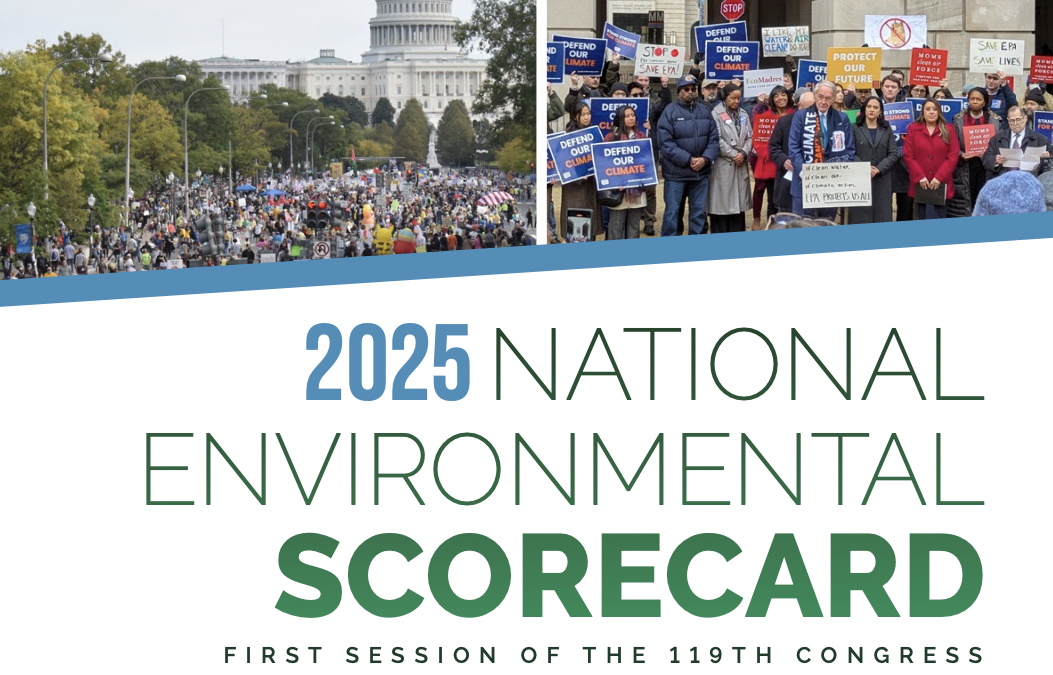
2025 LCV National Environmental Scorecard: Find the environmental voting records of Congress members (and contact them about their scores)
Feb 26, 2026

Each month, LCV shares five stories about the impact of our work. This month, we’re introducing the new LCV president, explaining the LCV v. Trump Part II lawsuit, celebrating history-making women in Congress, and featuring state democracy and clean energy wins in Idaho, Minnesota, Pennsylvania, and Virginia.
Pete Maysmith’s activism started early. He attended his first protest when in elementary school. Although he didn’t know it at the time, his experience linking arms alongside his mother, his younger sister, and countless others protesting a nuclear weapons facility would shape the rest of his life. That morning, Pete learned his first lesson about the power of collective action.
Since then, Maysmith has spent more than 30 years working at the forefront of environmental leadership, fighting for clean air and water, protecting public lands, and working to create a safe climate and environment for all. Most recently, he has served as:
Senior Vice President of Campaigns for LCV. Since taking on that role in 2017, Maysmith has worked alongside his team to conduct elections, advocacy, and organizing programs, public opinion research, and messaging strategy, helping to build LCV into the premier advocacy organization it is today.
Founding Executive Director of Conservation Colorado, LCV’s state affiliate. From 2009 to 2017, Maysmith led that organization, growing its influence and membership to more than 36,000. During that time, he also served on LCV’s board.
Maysmith’s extensive experience driving LCV’s political and campaign operations make him well suited to lead our organization and the broader Conservation Voters Movement through these unprecedented times and into this critical next chapter of our work. Beginning on April 15, Pete will formally accept the baton from Gene Karpinski, who is stepping down after 19 years as LCV’s president.
“LCV is a fantastic, smart, and powerful organization and I am so honored to succeed Gene Karpinski as president. The threats to our environment and democracy have never been more connected or more dire, and our nation’s biggest challenges – including the climate crisis – require political solutions. Together with our over 30 state affiliates in the broader Conservation Voter Movement, LCV is uniquely positioned to influence policy by working with and holding elected officials accountable, mobilizing, organizing, and building grassroots power in communities, and electing candidates who share our values. I can’t wait to get started,” he said.
Learn more about Pete Maysmith: Read the Q&A.
Big news: LCV is suing the Trump administration. Alongside a coalition of environmental organizations, LCV filed a lawsuit against a Trump executive action seeking to allow oil and gas drilling in protected waters in the Arctic and Atlantic Oceans.
LCV won a previous lawsuit challenging a similar executive action from the first Trump administration in the 2019 case LCV vs Trump.
– Gene Karpinski, LCV’s outgoing president
Here’s how we got here:
Nearly 40 percent of people in the U.S. live in coastal counties that rely on healthy oceans to thrive. Trump’s executive order will be devastating for those communities — and will create lasting damage to the environment and the fight against climate change. Risks include:
In addition to being ripe for legal challenges, Trump’s recent order is completely unnecessary and increasingly unpopular:
Rather than opening whole new areas to drilling, both climate change and environmental justice require that we finally reduce the amount of leasing and drilling in our nation’s waters. According to Christy Goldfuss, Executive Director at NRDC, “The law is clear: once a president permanently withdraws ocean areas from oil and gas leasing, those protections cannot simply be undone.”
From the first openly transgender woman being elected to Congress to two Black women now serving together in the Senate for the first time, women made history in 2024. These seven women are bringing us closer to our vision of a truly representative democracy and each is a fighter for our environment and our rights:
Sen. Angela Alsobrooks (MD) — First Black person to represent Maryland in the U.S. Senate who set ambitious emissions targets when serving as county executive of Prince George’s County.
Sen. Lisa Blunt Rochester (DE) — First Black person to represent Delaware in the U.S. Senate who was pivotal in passing the Inflation Reduction Act when serving on the House Energy & Commerce Committee.
Rep. Janelle Bynum (OR) — First Black woman to represent Oregon in Congress and entrepreneur who has fought for clean energy jobs and clean air.
Rep. Julie Johnson (TX-32) — First openly LGBTQ+ member of Congress from Texas and attorney who advocated for equality, justice, and vulnerable communities while serving in the Texas House.
Rep. Sarah McBride (DE-01) — First openly transgender member of Congress and trailblazing civic leader who supports workers, families, and clean energy investments.
Rep. Nellie Pou (NJ-09) — First Latina and person of Puerto Rican descent elected to Congress from New Jersey with a history of protecting land, air, and water.
Rep. Emily Randall (WA-06) — First LGBTQ+ Latina in Congress and community organizer with a strong environmental record in the state senate.
These individuals are important reminders of how far we’ve come — and how the fight for our future is far from over.
LCV’s connected Political Action Committee, LCV Action Fund, endorsed each of these history makers in 2024. The LCV Action Fund’s endorsement program seeks to elect environmental champions who will address the climate crisis and advance a more equitable clean energy future. In addition, LCV Action Fund understands the critical importance of a representative democracy and is committed to endorsing candidates that are reflective of the diverse communities and identities across the country.
In the midst of mounting threats to democracy, LCV’s state affiliates are holding the line and advancing democratic access for voters. Recent wins in Idaho and Virginia illustrate the importance and strength of the Conservation Voters Movement, which includes LCV and 30+ state affiliates across the country.
Three dangerous bills were defeated in the Idaho legislature — all designed to drastically limit the ability of everyday Idahoans to place and pass issues on the ballot that matter to their communities:
With deep Republican supermajorities in both chambers, the odds were stacked against a successful defeat of the measures, but LCV’s affiliate, Conservation Voters for Idaho (CVI), was strategic in their approach:
The coordinated actions from CVI resulted in a significant victory for democracy: HB 85 was killed in committee with a 7-7 vote, and SJR 101 was pulled before it ever made it to the Senate floor, as CVI’s efforts had flipped enough Republican votes to defeat it outright. And for HB 2, the public opposition to the first two bills was strong enough that the sponsor dropped the bill and didn’t even seek a hearing.
The state’s legislative session wrapped up with another victory for democracy. Both chambers of the General Assembly voted to amend the constitution to automatically restore voting rights to felons who have served their time. Here’s what happens next:
LCV’s state affiliate, Virginia League of Conservation Voters (VALCV), played a key role in this victory:
LCV’s state affiliates across the country are leading the charge in creating a truly representative and equitable democracy for all.
With the Trump administration and Elon Musk dismantling federal environmental protections and clean energy progress, it’s more important than ever for states to lead the way. Across the country, states are leaning into their clean energy agendas, standing strong in their commitments to confront climate change, and pushing back on the federal budget cuts and withholding of funds that jeopardize their clean energy plans.
Minnesota’s Climate Innovation Finance Authority began funding projects that promote clean energy solutions across the state. The program will loan at least $25 million each year to projects that help advance the state’s climate goals, including solar and hydrothermal projects, battery manufacturing, and electric vehicle infrastructure.
LCV’s state affiliate, Conservation Minnesota and their partner Conservation Minnesota Voter Center were instrumental in securing the state’s commitment to 100% clean energy in 2023. Establishing a state green bank, which uses innovative financing to support investments in clean energy infrastructure, was an important component of that commitment. Together, the two organizations accomplished the following:
In early February, Pennsylvania Governor Josh Shapiro sued the Trump administration for illegally freezing more than $2 billion of climate and clean energy funds, including funds for clean, electric school buses. Two weeks later, those funds were released, after the governor engaged directly with the White House regarding the suit.
As quoted in the Pittsburgh Post-Gazette, according to Shapiro, “every single dollar that we identified at the filing of our lawsuit is currently unfrozen and once again accessible to Pennsylvania state agencies. We now will resume critical programs and infrastructure projects that have been jeopardized by this illegal freeze.”
In addition, Governor Shapiro reached an agreement with the region’s electric grid operator, PJM Interconnection, to lower customer energy costs. The action came after the governor filed a formal complaint against PJM to the Federal Energy Regulatory Commission. Under the agreement, PJM will lower the price cap for capacity auctions through 2028 — the process through which PJM purchases electricity generation — by around $200, saving Pennsylvania consumers billions of dollars on their energy bills.
LCV’s state affiliate, Conservation Voters of Pennsylvania has worked to maintain continuous positive pressure on the Shapiro administration to defend ratepayer rights and advance clean energy, including:
Progress in the states holds real promise over the coming months and years. Thanks to the work of LCV and our state affiliates in the Conservation Voters Movement, more than 40% of people in the U.S. now live in states and localities committed to 100% clean energy — up from 1% before we began this work in 2018.